Regional Training Institute, Kolkata
In pursuit of excellence
INTRODUCTION
Regional Training Institute, Kolkata was set up in April 1998 as Regional Training Centre. In 2005, the office began functioning from its current location in CGO Complex at Salt Lake in Kolkata. It is probably the youngest RTI in the Department.
 It currently meets the training needs of 19 user offices.It provides training to field offices of IA&AD in Eastern and North-Eastern States of India and to other non-IA&AD offices as well. The staff and officers of FA&CAO, Eastern and South-Eastern Railways, Directorate of Local Bodies in Assam and Tripura, and officials from Government of West Bengal are also trained in the institute.
It currently meets the training needs of 19 user offices.It provides training to field offices of IA&AD in Eastern and North-Eastern States of India and to other non-IA&AD offices as well. The staff and officers of FA&CAO, Eastern and South-Eastern Railways, Directorate of Local Bodies in Assam and Tripura, and officials from Government of West Bengal are also trained in the institute.
RTI, Kolkata is designated as knowledge centre for Compliance Audit, Audit of Railways and Local Bodies.


TRAINING DELIVERY
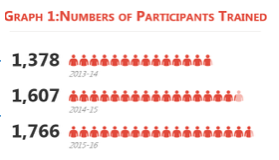 RTI, Kolkata conducts round the year training programmes on both EDP and General (non-EDP) courses. Graph 1 gives a synoptic view of the number of participants trained at RTI, Kolkata.
RTI, Kolkata conducts round the year training programmes on both EDP and General (non-EDP) courses. Graph 1 gives a synoptic view of the number of participants trained at RTI, Kolkata.
METHODOLOGY
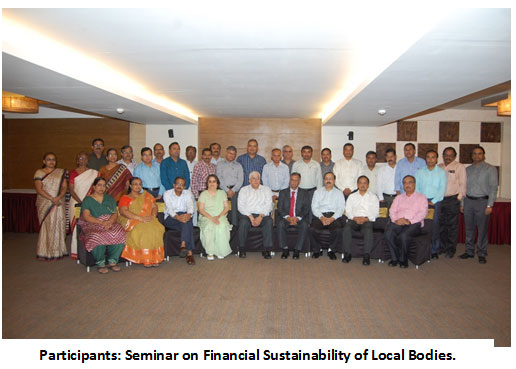
RTI Kolkata’s training methodology is not limited to classroom lectures alone. Group discussions, group exercises, case studies and field visits, where possible, are actively resorted to for effective delivery of training. The idea is to give maximum exposure to the trainees about the practical problems and to have the opportunity to interact with the experts directly involved in implementation of government programmes and schemes at the grass-root level. The field experts are invited quite often to share their views, ideas and experience with the trainees. The training modules are developed in active consultation with the user offices and experts in the field.
Partnership Arrangement: RTI, Kolkata has developed partnership arrangement with different premier institutions in the state of West Bengal, particularly in Kolkata. To name the few, they are Institute of Chartered Accountants of India, Institute of Cost Accountants of India, Indian Institute of Management, Kolkata, International Management Institute, Kolkata, Jadavpur University, Viswa-Bharati University and Rabindra Bharati University etc. This apart, we have faculty exchange arrangement with Administrative Training Institute, Government of West Bengal and State Institute of Panchayats and Rural Development, Kalyani in West Bengal. We receive the regular stream of eminent faculties and experts from those avowed institutions. The partnership arrangement contributes greatly in maintaining the high standard of qualitative trainings over the years.
 Seminars and Workshops: As a part of Knowledge centre activities, RTI, Kolkata organises seminars and conferences regularly to augment and update the knowledge base of the institute as well as that of the participants. The most important seminar held in last couple of years was ‘Financial Sustainability in PRIs’ in August 2013. The seminar was inaugurated by Shri Shankar Naryan, DAI and eminent experts like Shri S.M.Vijayanand, Shri Raghunandan, Shri Nikhil Dey, Shri M.N.Roy, Shri Dilip Ghosh, Shri Abhirup Sarkar etc shared their valuable ideas and experience in the seminar. All India seminars on 13th Finance Commissions and Local Bodies in January 2012 and All India workshop on ‘Implementation of Model Accounting System and PRIASOFT in PRIs’ in February 2014 were also very highly acclaimed seminars organised by RTI, Kolkata. In addition,the regional workshops are organized at regular interval on the topical issues relevant to the Knowledge centre.
Seminars and Workshops: As a part of Knowledge centre activities, RTI, Kolkata organises seminars and conferences regularly to augment and update the knowledge base of the institute as well as that of the participants. The most important seminar held in last couple of years was ‘Financial Sustainability in PRIs’ in August 2013. The seminar was inaugurated by Shri Shankar Naryan, DAI and eminent experts like Shri S.M.Vijayanand, Shri Raghunandan, Shri Nikhil Dey, Shri M.N.Roy, Shri Dilip Ghosh, Shri Abhirup Sarkar etc shared their valuable ideas and experience in the seminar. All India seminars on 13th Finance Commissions and Local Bodies in January 2012 and All India workshop on ‘Implementation of Model Accounting System and PRIASOFT in PRIs’ in February 2014 were also very highly acclaimed seminars organised by RTI, Kolkata. In addition,the regional workshops are organized at regular interval on the topical issues relevant to the Knowledge centre.
Training Resources
RTI, Kolkata is actively involved in preparing of training resources like:

Research Papers: Complex issues are often addressed by research papers published by RTI, Kolkata. These are on varied disciplines to generate new ideas that are practical and implementable. These are prepared so that our user offices could be egged on to develop more interesting audit ideas. Many of these are a prelude to the development of new auditing issues and scrutiny of erstwhile unrecognised phenomenon by our user offices. These then lead to more interesting reports and appreciation from different quarters, including those being audited.
Six research papers have been prepared by RTI, Kolkata so far. The paper deserving special mention here is ‘Benchmarking tools for PRI’.The paper seeks to establish performance indicators to judge the performance of PRIs against their goals, objectives and targets. The need for definite performance indicators was felt by varied stakeholders of local Bodies. Some of them might have evolved their indicators to suit their own limited purposes but that have not yet come to public domain for the sake of acceptance and for wider uses.
An extensive field study was undertaken in seven Gram Panchayats of Birbhum district in collaboration with Rural Extension Centre, Viswa-Bharati University. The Institute of Cost Accountants came forward to provide the technical help to the project.The eminent experts in the field were involved and they enriched the paper with their ideas and suggestions and RTI, Kolkata takes this opportunity to acknowledge their valuable contributions.
The paper formulated various ratios representing the overall performance of the PRIs. The ratios give an idea about the performance of local bodies in the light of expectations of stakeholders. This will, at the same time, facilitate the inter-unit and intra-unit comparative and comprehensive assessment of various functions of local self Governments under uniform or nearly similar situation. Moreover, on audit side, the ratio analysis strengthens the audit objections and adds value to the Audit Reports. The primary objective of the study was to provide benchmarking tools of PRIs by setting the linkage between the input and output. The inputs are the sources of fund while the outputs may be the asset/benefits/utility created or other improvements made in the socio-economic life of the inhabitants. Our work was primarily based on the financial parameters giving an overall picture about the performance and efficiency of the Gram-Panchayats. The RTI, Kolkata made the pioneering job in this regard with a lot of scope for further expansion in this challenging sphere.
Structured Training Modules
Seven Structured Training Modules on Audit of local bodies and Railways have been prepared and they are updated regularly.
i. Audit of Rural and Urban Local Bodies
RTI, Kolkata has prepared five STMs on audit of Local bodies. These address audit of Gram Panchayats, Audit of Panchayat Samiti and Zilla Parishad, Audit of Urban Local Bodies. The modules were chiefly based on, among others,
74th Constitutional Amendment, Recommendations of Finance Commissions, and National Municipal Accounts Manual etc.
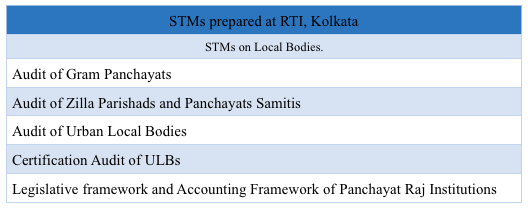
Further, a STM on Legislative/ Constitutional framework along with accounting framework of Panchayati Raj Institutions was prepared by RTI, Kolkata with the object of giving historical perspective of Panchayati Raj Institutions, their evolutions and present accounting framework on comparative basis as prevailing in different states.
ii. Audit of Railways
RTI, Kolkata has prepared two Structured Training Modules (STM) on audit of Railways. These STMs were prepared to address the organizational complexity and procedural diversities in different departments and units of the Indian Railways. The primary objective was to equip Railway Audit offices with expertise through a structured training document. The STM on audit of Railways addresses in a holistic manner the areas of utmost importance such as Railway budgets, Establishments and Commercial (Traffic and Earnings) departments along with Railway constructions, Store, Workshops, Safety, Signalling and IT.

The Railways,besides being a Government department, are also commercial enterprises as they are engaged in manufacturing and in selling of transport services and thus earning profits, maintaining its own assets and paying interest (i.e. dividend) to the General Revenues. The Government Accounts are kept purely on cash basis whereas the accounts of the Railways are also kept on accrual basis. While the Railway is required to keep the records, prepares and presents the reports in commercial terms it has to feed the information to Government in the format prescribed. Therefore, the Railway has to maintain various accounts and records for meeting the requirements of both. The STM on Railway finance and Appropriation Accounts attempts to equip the trainees with the fundamentals of cash basis and accrual basis in the light of dual accounting systems followed in the railways.
Case Studies
This is a learning technique in which a real situation or series of events is presented to trainees for their analysis and consideration of possible solutions to the problems identified. Their findings can be compared subsequently with what actually occurred. Case studies imbibe problem solving skills, analytical skills and identifying variables. It results in gaining confidence in decision-making, changing/modifying attitudes and teamwork.

In pursuit of excellence in our assigned areas of Knowledge Centre, we attempted to bring out series of interesting case studies on frauds/misappropriations / deviation from rules and regulation as reported and in the Comptroller and Auditor General of India’s Audit Report on different State Governments. In preparing these case studies, the models adopted by INTOSAI and some other business schools are followed. They provide insight into internal control failures in the organisation and the methodology applied by auditors to come out with revelation. The case studies indicate as well how to apply IDEA in audit and risk assessment. These case studies are used to train participants in the areas of Compliance Audit by providing them with a simulated environment of situations that they are likely to face in their official assignments.
Seminars, Conferences and Workshops
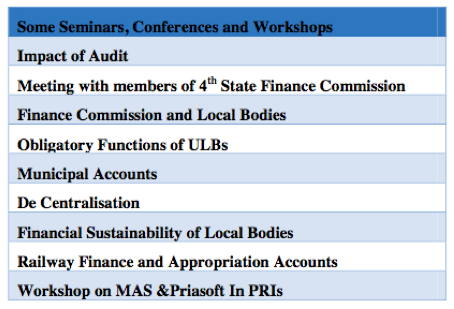
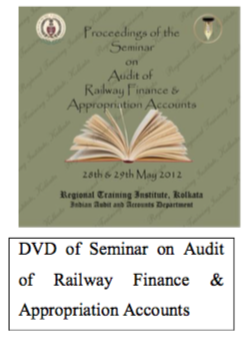
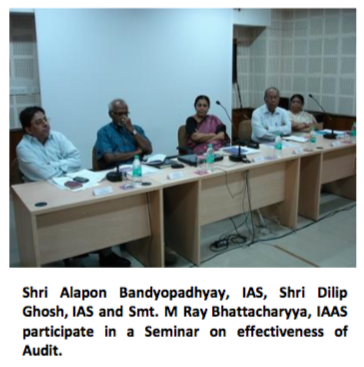
Seminars and Conferences bring together small groups for interaction and discussion in which everyone present is requested to actively participate. This is often accomplished through an ongoing Socratic dialogue with a seminar leader or instructor, or through a more formal presentation of research works. It is essentially a place where assigned topics are discussed, questions are raised and debates are sometime conducted. It is relatively informal, at least compared to the lecture system of instruction practices most commonly in classrooms. Because seminars and conference are less structured, they help raising multifarious views on the topic at hand. The speakers often introduce new ideas or pose some interesting questions which are then explored by those who gathered. It is a valuable platformfor questioning, discussing and putting forward diverse view points across the populace.
Field Visit and Study

Field trip is a training method, which provides a dynamic environment near or within the scene of real action for learners to imbue knowledge. It is a training method in which opportunities are provided to the learners to visit organisations, work sites, communities or villages, etc. with a view to observe, be a part of and collect information to reflect, analyse and learn from. They use the experience undergone by them for learning during and after the trip. Field trips thus help create a dynamic learning environment. Further, it helps to establish familiarity with or provides exposure to work culture, work practices, work conditions, constraints, etc. in organisations. It helps to assure the practicality of new ideas. This in turn can generate thoughts on various aspects to be considered for implementation of these ideas. These ideas could be useful to both the trainees and the host organisations. Further, it helps to secure first-hand information from experienced people about the job/ organisation and helps to develop skills for managing uncertainties. It also challenges pre-conceived views/perceptions. RTI, Kolkata routinely organises field visits as part of its Management Development programmes and environment audit.
INFRASTRUCTURE
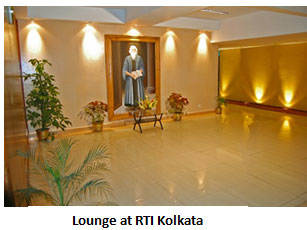
As an apex training institute for all IA&AD offices located in Kolkata, the RTI has a compact and aesthetically designed infrastructure located in Central Government Office Complex at Salt Lake. The institute is divided into two blocks, Administrative block and Training block. While the Administrative block contains Library, Seminar cum General Lecture Hall, Conference Hall, Lounge and offices, the Training block contains two EDP Labs with a total capacity of 47 (26+21) participants, a General Lecture Hall for 30 participants and an amenities hall for the trainees.
The RTI is fully equipped with state-of-the art audio-visual training aids viz., LCD projectors and Panasonic boards in all the three class rooms. The computers installed in the classrooms as well as those in the Administrative Block are networked and connected through LAN. The computers in the class rooms are also connected to a central Un-interrupted Power Supply (UPS) system having 2 hours battery back-up time.
Hostel facilities
The Hostel of the RTI, Kolkata, located in IAAD premises at 1/5 CIT Road Scheme VII M, Ultadanga, Kolkata-700 059, has been in operation since February 2007. The hostel has facilities for recreation such as a library and a TV Lounge cum Music Room. Computers are also available in each room so as to enable the trainees to practise after office hours. The Hostel can accommodate 30 participants and also has two suites for the Guest Faculty.
Library
The Institute has a well-stocked Library with approximately 1621 books on various subjects. Apart from books on Computers, Management, Accountancy, Law, Costing, Urban & Rural Administration, Office Codes and Manuals etc., it has also Audit Reports on different Auditee organizations/departments and Journals issued by the office of the Comptroller and Auditor General of India, INTOSAI and ASOSAI. Periodicals on Urban and Rural Local Governance, VCDs, Software, e-books and Courseware etc. are also available in the library.
Management of Activities of RTI
This institute has developed in-house an application software, named RTI Activities Monitoring Application which covers Training Management, Financial Management, Knowledge Centre Data Management, Dak Management, Library Management, Hostel Management, Asset Management, Stock Management and Record Management etc. This is a Network based application. Everyone can generate report but accessibility to enter data is restricted to the authorised person only. Participants can also enter into the system for their feedback, course-end evaluation and library. This is unique software developed to meet all kinds of requirements of RTIs and can be used in other training institutes.
Conclusion: RTI, Kolkata has been attracting very dedicated, highly motivated and creatively talented leaders, officers and staffs from the department and its achievements were made possible by the sheer hard work and urge to achieve excellence on their part in all spheres of activities of the institute.It may not be an exaggeration to say that innovation and excellence have got into the DNA of RTI, Kolkata and all associated with the institute are consciously dedicated to maintain the standard.
Continue Reading |
-

From the Editor's Desk
This issue of the journal is the first issue with a thematic approach of “Capacity Building”. It will be our endeavour to continue this approach in future
...more
-
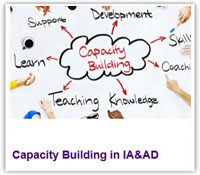
Capacity Building in IA&AD
Mission statement of IA&AD eloquently states “Mandated by the Constitution of India
...more
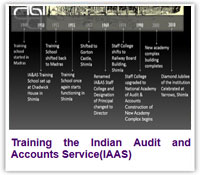
Training the Indian Audit and Accounts Service(IAAS)
The Officer Trainees (OTs) entering the Indian Audit and Accounts Service(IAAS)
...more
-
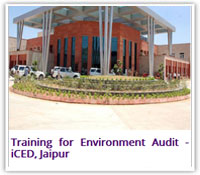
Training for Environment Audit - iCED, Jaipur
iCED also contributes to build capacity of other Supreme Audit
...more
|
-
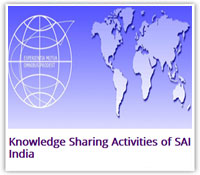
Knowledge Sharing Activities of SAI India
Comptroller and Auditor General of India(SAI India) is acknowledged as a leading
...more
-
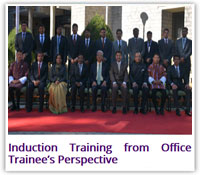
Induction Training from OTs’ Perspective
Journey from a civil services aspirant to a successful candidate and further to a
...more
-

From International Desk
The CAG of India occupies several important positions in INTOSAI and ASOSAI.
...more
-

Important Communications
Amendment to Para 7.12 of PA Guidelines, Compliance Auditing Guidelines, Practitioner's Guide for use of Data Visualisation & Infographics
...more
-

From the Editor's Desk
This issue of the journal is the first issue with a thematic approach of “Capacity Building”. It will be our endeavour to continue this approach in future
...more
|
|
|
|
|